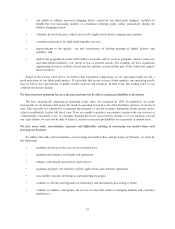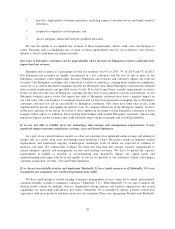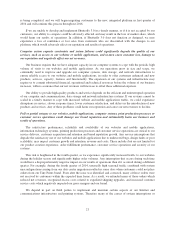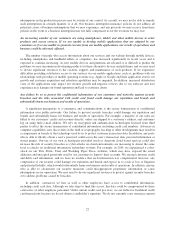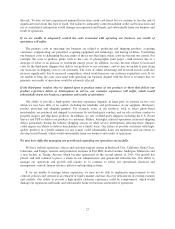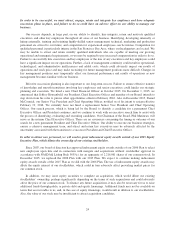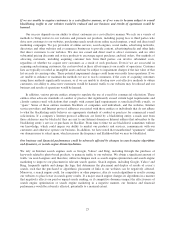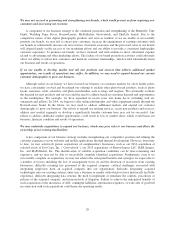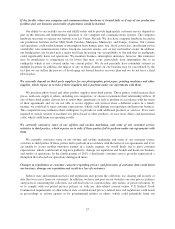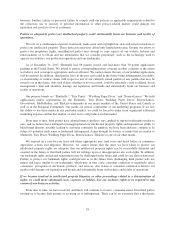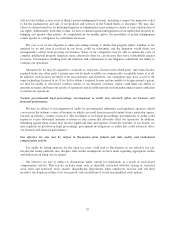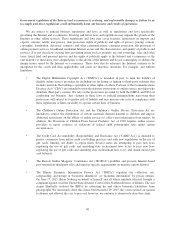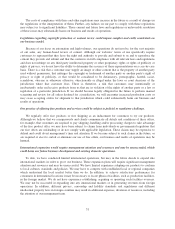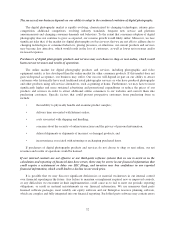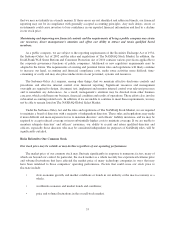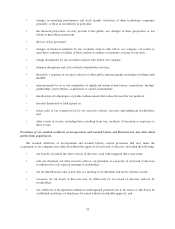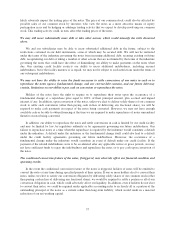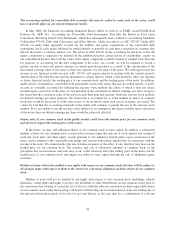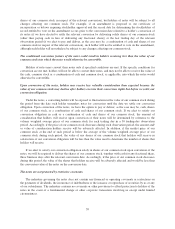Shutterfly 2015 Annual Report Download - page 31
Download and view the complete annual report
Please find page 31 of the 2015 Shutterfly annual report below. You can navigate through the pages in the report by either clicking on the pages listed below, or by using the keyword search tool below to find specific information within the annual report.will not take further action, such as filing a patent infringement lawsuit, including a request for injunctive relief
to bar the manufacture and sale of our products and services in the United States or elsewhere. We may also
choose to defend ourselves by initiating litigation or administrative proceedings to clarify or seek a declaration of
our rights. Additionally, from time to time, we have to defend against infringement of our intellectual property by
bringing suit against other parties. As competition in our market grows, the possibility of patent infringement
claims against us or litigation we will initiate increases.
The cost to us of any litigation or other proceeding relating to intellectual property rights, whether or not
initiated by us and even if resolved in our favor, could be substantial, and the litigation would divert our
management’s efforts from growing our business. Some of our competitors may be able to sustain the costs of
complex intellectual property litigation more effectively than we can because they have substantially greater
resources. Uncertainties resulting from the initiation and continuation of any litigation could limit our ability to
continue our operations.
Alternatively, we may be required to, or decide to, enter into a license with a third party. Any future license
required under any other party’s patents may not be made available on commercially acceptable terms, if at all.
In addition, such licenses are likely to be non-exclusive and, therefore, our competitors may have access to the
same technology licensed to us. If we fail to obtain a required license and are unable to design around a patent,
we may be unable to effectively conduct certain of our business activities, which could limit our ability to
generate revenues and harm our results of operations and possibly prevent us from generating revenues sufficient
to sustain our operations.
Various governmental legal proceedings, investigations or audits may adversely affect our business and
financial performance.
We may be subject to investigations or audits by governmental authorities and regulatory agencies, which
can occur in the ordinary course of business or which can result from increased scrutiny from a particular agency
towards an industry, country or practice. The resolution of such legal proceedings, investigations or audits could
require us to pay substantial amounts of money or take actions that adversely affect our operations. In addition,
defending against these claims may involve significant time and expense. Given the visibility of our brands, we
may regularly be involved in legal proceedings, government investigations or audits that could adversely affect
our business and financial performance.
Our effective tax rate may be subject to fluctuation from federal and state audits, and stock-based
compensation activity.
Tax audits by taxing agencies for the open tax years could lead to fluctuations in our effective tax rate
because the taxing authority may disagree with certain assumptions we have made regarding appropriate credits
and deductions in filing our tax returns.
Our effective tax rate is subject to fluctuations under current tax regulations as a result of stock-based
compensation activity. This activity includes items such as shortfalls associated with the vesting of restricted
stock units and restricted stock awards, disqualifying dispositions when employees exercise and sell their
incentive stock options within a two year period, and cancellation of vested non-qualified stock options.
29


